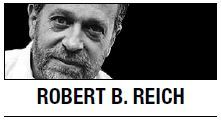However you read the polls, the 2012 presidential election is turning into a nail-biter. Former Gov. Mitt Romney and President Barack Obama are just about tied among likely voters.
The bump Romney got from the first debate seems to have been matched by the bump the president got from the good jobs report for September. (We won’t know the real results of Tuesday night’s matchup for another week.)

But beware. Polls of “likely voters” are notoriously imprecise because they reflect everyone who says they’re likely to vote ― including those who hope to but won’t, as well as those who won’t but don’t want to admit it.
The biggest party in America is neither Democrats nor Republicans. It’s the Party of Non-Voters. Its membership outnumbers registered Democrats and registered Republicans.
In a typical presidential election, a bare majority of Americans bother to vote. Since World War II, turnout has usually hovered between 50 percent and 60 percent.
In this respect, 2008 was unusual ― summoning 63 percent of us to the polls.
The Party of Non-Voters is mostly lower-income. Its members are overwhelmingly poor whites, African-Americans, Hispanics and young people.
In 2008, many of them deserted the Party of Non-Voters and went to the polls. For example, a whopping 65 percent of eligible African-Americans voted. So did 49 percent of people between the ages of 18 and 24 ― an age group that’s normally far less likely to vote. Hispanics also went to the voting booths in unusually large numbers.
And most of them voted for Barack Obama.
So the real question in 2012 is whose potential supporters are more motivated to vote, and whether President Obama can rely on anything close to the turnout he got in 2008.
In 2008, the biggest motivator was hope. But this time around there isn’t much enthusiasm for either candidate. The Republican base has never particularly liked Romney, and many Democrats have been disappointed in Obama.
The biggest motivator this time around is fear of the other guy.
There’s clear reason for members of the Party of Non-Voters to fear Romney and his running mate, Rep. Paul Ryan. Their reverse Robin Hood budgets would take from the poor and middle class and reward the rich. Their determination to turn Medicare into a voucher program and turn Medicaid over to cash-starved states would hurt some of the most vulnerable members of our society.
Hispanics are also worried about Romney’s support for Arizona’s draconian immigration law that allows police to stop people merely because they look Hispanic, and his enthusiasm for so-called “voluntary deportation” ― making life so hard for undocumented workers that they’re forced to leave.
Young people, who tend to be liberal on social issues, fear Romney and Ryan’s opposition to abortion, and their rejection of equal marriage rights. As a result, they worry, too, about who Romney might pick for the Supreme Court.
But will these fears be enough to summon these people to the polls in large numbers? Romney is such a chameleon that in the debates he has seemed to disavow everything he’s stood for, hide many of his former positions, and even sound somewhat moderate.
Meanwhile, for four years the GOP and its auxiliaries in Fox News and yell radio have told terrible lies about our president ― charging he wasn’t born in America, he’s a “socialist,” he doesn’t share American values.
They’ve drummed up fears in a public battered by an economic crisis Republicans largely created, while hiding George W. Bush so we won’t be reminded. And they’ve channeled those fears toward President Obama and even toward the central institutions of our democracy, casting his administration and our government as the enemy.
They’ve apparently convinced almost half of America of their lies ― including many of those who would suffer most under Romney and Ryan. And those fears and lies will almost certainly get many Americans to the polls.
Republicans are well practiced in the politics of fear and the logistics the big lie.
The challenge for Obama and Vice President Joe Biden in the weeks ahead is to counter those fearsome lies with the truth. That truth isn’t only what Romney and Ryan are likely to do to the nation if elected.
Obama and Biden must also reignite hopes about what they can do, if reelected, to steadily improve the lives of most Americans.
By Robert B. Reich
Robert B. Reich, chancellor’s professor of public policy at the University of California and former U.S. secretary of labor, is the author of “Beyond Outrage: What has gone wrong with our economy and our democracy, and how to fix it,” a Knopf release now out in paperback. ― Ed.
(Tribune Media Services)








